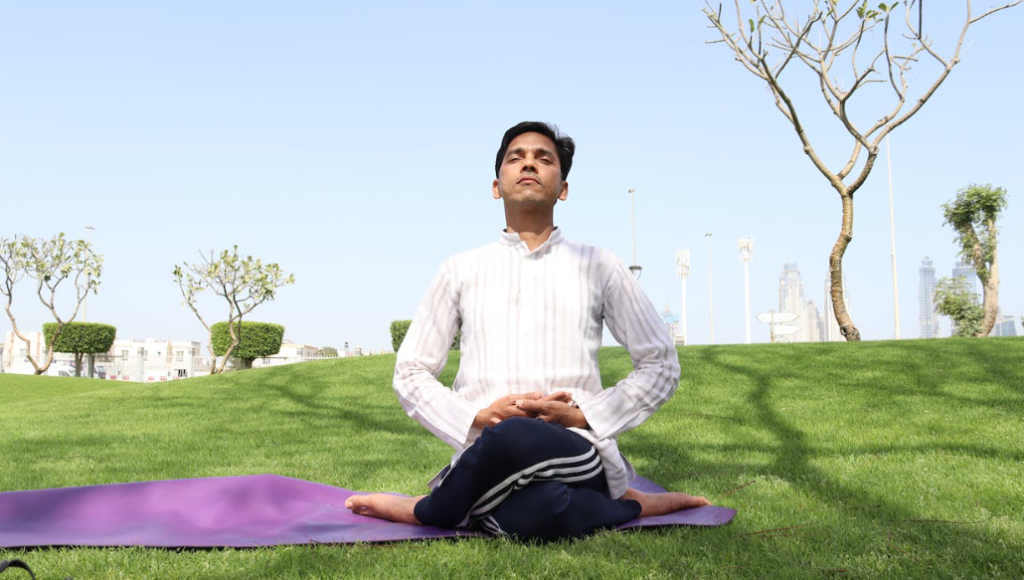Why Mindfulness Meditation is Important?
A wealth of new research has explored this age-old practice. Here’s a look at its benefits and importance of mindfulness meditation.

Selfpause Affirmation App
Download the app to get 1,000’s of affirmation meditations and everything you need to write, record and listen to your own.
Mindfulness is an important practice for a number of reasons. For starters, it helps you improve your cognitive abilities by teaching you to become more aware of your thoughts and feelings without imposing judgment on them. These abilities are essential for a variety of everyday tasks, including thinking quickly and adapting to changing information. It can also help you concentrate better and solve problems more efficiently.
Benefits of practicing mindfulness meditation

Mindfulness meditation is a practice that focuses on being aware of the present moment. It involves being kind to yourself and accepting what you experience. It also helps you connect with your inner self. It is not easy to start meditating, so you must commit with determination. To begin, set a timer for at least 10 minutes a day. You may be tempted to do other things while you’re meditating, so it helps to set a gentle alarm so you don’t get distracted. Once you’ve mastered the timer, you can increase your meditation to fifteen minutes daily.
In addition to helping you reduce anxiety and stress, mindfulness can help you become more accepting of yourself. This way, you can handle stressful situations better. It can also help you develop a better immune system. It has also been proven that people who practice meditation regularly are less likely to suffer from depression and other emotional problems.
Mindfulness meditation has also been shown to increase working memory, which can improve your ability to focus and learn. A study in 2010 found that people who practiced mindfulness meditation had better working memory compared to those who didn’t. Furthermore, the practice of mindfulness was associated with improved working memory in the military group, and decreased working memory capacity in the nonmeditating civilian group.
Other benefits of practicing mindfulness meditation include an improvement in sleep and decreased daytime fatigue. It can also help people lose weight. Unlike lifestyle change programs, mindfulness programs often involve weekly group sessions and home mindfulness exercises for an eight-week period. The aim of these programs is to reduce stress, anxiety, and emotional exhaustion.
Another benefit of practicing mindfulness meditation is an increased ability to be kind to yourself. During meditation, therapists and health care professionals who are training with mindfulness have reported improved self-compassion. These practitioners report improved empathy, improved comfort with silence, and increased overall well-being. However, more research is needed to examine the impact of mindfulness on burnout among those in the healthcare field.
Mindfulhttps://selfpause.com/mindfulness/
ness meditation can help people overcome stress and anger. It can also help them improve their relationship skills. When practiced regularly, it can also improve group cohesion and relational skills, which are measurable characteristics of effective psychotherapy.
Effects of mindfulness meditation on emotional reactivity

This article reviews a recent study investigating the effects of mindfulness meditation on emotional reactivity. Researchers used a 39-item scale to measure trait mindfulness, which has been linked to reduced emotional reactivity. This measure measures the level of awareness that participants show when they are in the present. This state of mindfulness can increase or decrease, depending on time and the environment. Although the study did not test participants who practiced mindfulness meditation daily, the findings suggest that meditation can improve this state.
In addition to examining the effects of mindfulness meditation on emotional reactivity, researchers are also interested in the brain areas involved in emotion regulation. Mindfulness meditation has been associated with increased activity in the alpha region of the EEG, which is a signal of higher-order neural activity. This brain activity is associated with higher-order thinking, a characteristic known as executive functioning.
These results are promising because they highlight the role that emotion regulation plays in mental health and normative functioning. In addition, this research could lead to novel therapeutic targets and help streamline the development of effective interventions. However, the research on the mechanisms involved in emotion regulation is still in its infancy.
The findings suggest that meditation may improve emotion processing. It may decrease the reactivity of conditioned emotional states such as anger and anxiety. Although further research is needed, this research highlights the importance of a practice that can lead to greater awareness and insight. The authors concluded that there are two main factors that affect a person’s emotional state. One of these is their ability to improve their self-awareness.
Although these effects were not statistically significant, the authors suggest that these findings are consistent with the findings of previous studies. The authors’ results suggest that meditative theta could be a marker of a quality meditation. This finding is promising for future studies of mindful emotion regulation.
Effects of mindfulness meditation on physical health

Research on the effects of mindfulness meditation on physical health has been mixed. Some research suggests that the practice boosts general well-being, while other studies suggest it can cause harmful side effects. The research, however, is still preliminary. Although it has become popular for its mental health benefits, more research is needed to better understand the potential harms and benefits of the practice.
Research has shown that mindfulness meditation can improve several physical health outcomes, including the reduction of stress, depression, and chronic pain. The practice has also been associated with improved attentional functioning and performance on all measures of attention. It has also been linked to increased protective tissue around axons in the anterior cingulate brain region.
While it may not directly affect your physical health, the research suggests that mindfulness meditation can help people suffering from heart disease. The technique can help reduce high blood pressure, which puts additional strain on the heart. This can contribute to atherosclerosis, a condition that can lead to heart attack. By improving the quality of life, mindfulness meditation can benefit people suffering from high blood pressure. In addition, it can reduce the risk of heart attack.
In addition to its physical benefits, mindfulness meditation can also improve your mental health. Studies have shown that people who practice this form of meditation report less stress, increased mindfulness, and reduced anxiety. It has also been found to reduce the number of negative emotions, which is a key component of stress and anxiety.
While mindfulness is an effective wellness practice, it can be challenging for some people. It may not be the right therapy for everyone, so talk with your therapist if you are unsure if this practice is right for you. Even if you’re curious about mindfulness, there are many resources available to help you learn how to practice.
Researchers have also found that meditation can improve cognitive abilities. By learning to be more aware of our thoughts without imposing judgments, it improves people’s ability to focus, adapt to changing information, and switch tasks. This makes it easier to concentrate on tasks and solve problems efficiently.
How to practice mindfulness meditation

When you are considering trying mindfulness meditation, the first step is to find a program that is suitable for you. You should choose a program that suits your personal goals, experience, and results. For example, a program for people with chronic severe anxiety will be different from one for people with temporary anxiety. The basic techniques for mindfulness meditation involve sitting or lying down, closing your eyes, and breathing normally. You can then modify your program to address specific sensations and your own needs.
Before starting a mindfulness meditation session, it’s important to understand the purpose of mindfulness. It is important to remember that the goal of mindfulness meditation is not to achieve a specific state or to eliminate negative thoughts. The goal of mindfulness meditation is to accept whatever comes up in the present moment without trying to change it. You should also avoid trying to push away thoughts, but instead, try to notice them and return your awareness to the breath.
While practicing mindfulness meditation requires patience and perseverance, it can greatly improve your quality of life and ability to manage stress. Various resources and mindfulness apps are available that can help you learn the basics of the practice. Using the resources in this article, you’ll be well on your way to being able to practice mindfulness anywhere and anytime. You can even practice mindfulness while you’re in the middle of a conversation, eating, or standing in a line. As long as you’re not preoccupied with judgment and interpretation, you can practice mindfulness anywhere.
The first time you try mindfulness meditation, it may be difficult to relax. Most first-time meditators experience this. However, if you’re persistent, it will pay off in the long run. And it will improve your mental and physical health. When you’re able to relax, you’ll have the opportunity to access your true self and experience a greater sense of awareness.
Mindfulness meditation is a mental training practice that can reduce the symptoms of anxiety and depression. It rewires the brain by promoting awareness of the present moment. It teaches you to focus attention, recognize worrying thoughts for what they are, and release them. It will help you reduce your stress levels and improve your sleep.
Our Top FAQ's
Some potential benefits of mindfulness meditation include reduced stress and anxiety, improved concentration and focus, increased self-awareness, and improved emotional regulation. It may also have physical health benefits, such as lower blood pressure and a stronger immune system.
Research has shown that mindfulness meditation can change the structure and function of the brain in positive ways. It may increase the density of gray matter in areas of the brain involved in learning, memory, and emotion regulation, and it may also lead to changes in brain waves and connectivity.
Mindfulness meditation has been shown to be an effective treatment for a variety of mental health conditions, including depression, anxiety, and stress. It may also improve well-being by helping individuals to cultivate a more positive outlook and increased self-compassion.
Mindfulness meditation involves paying attention to the present moment, without judgment, and allowing thoughts and feelings to come and go without reacting to them. Other types of meditation may focus on a specific object, thought, or mantra, or may involve visualizing certain images or concepts.
Mindfulness meditation can be practiced by anyone, regardless of age, background, or experience level. It may be particularly helpful for individuals who are looking to reduce stress and improve their overall well-being, but it can be beneficial for anyone who is interested in cultivating greater self-awareness and mindfulness.
